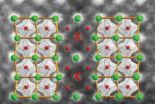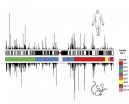(Press-News.org) TALLAHASSEE, Fla. -- A new line of research from a team at Florida State University is pushing the limits on what the world knows about how human genetic material is replicated and what that means for people with diseases where the replication process is disrupted, such as cancer.
The team, lead by Department of Biological Sciences Professor David Gilbert and post-doctoral researcher Ben Pope, has taken an in-depth look at how DNA and the associated genetic material replicate and organize within a cell's nucleus. Their work could be especially crucial for doctors and medical researchers who have found that the replication process is typically disrupted in cancer patients.
"Why does this process exist? Why is it awry in diseases? That's why this research is important for us as a society," Gilbert said.
The paper, appearing in the Nov. 19 edition of the journal Nature, sheds light on a subject that is poorly understood by researchers worldwide and naturally of great interest because of the future advances that can occur with breakthroughs.
Pope and Gilbert's paper is a companion piece to a bigger, multiuniversity project called ENCODE, funded by the National Institutes of Health. The multiuniversity effort offered a comprehensive review of the mouse genome and found many similarities and differences with the human genome.
In addition to their own paper on DNA replication, Pope and Gilbert are also listed as contributors to the ENCODE piece.
In their work, Pope and Gilbert examined the replication process in detail so they could identify the units by which the genetic material replicated. They knew it happened at regular intervals, but they needed to know where the boundaries were.
"The fundamental first step in understanding a new phenomenon in nature is to identify the units of regulation, and we finally have that," Gilbert said.
Scientists believe continued research in this area could lead to novel treatment options for cancer patients and those that could benefit from stem cell-based therapies.
"The process is well conserved in many species, suggesting it's critical," Pope said, "but we really don't know why. More research will help us understand why this process is disrupted in cancer and other diseases."
INFORMATION:
The current research is funded by the National Institutes of Health. In addition to Gilbert, Pope worked closely with New College Assistant Professor Tyrone Ryba, previously a graduate student in Gilbert's lab. Other researchers from Florida State include Assistant Professor Jonathan Dennis and graduate students Daniel Vera and Vishnu Dileep.
CONTACT: Kathleen Haughney, University Communications
(850) 644-1489; khaughney@fsu.edu
BOSTON - November 19, 2014 - Each year in the Northern Hemisphere, levels of atmospheric carbon dioxide (CO2) drop in the summer as plants inhale, and then climb again as they exhale and decompose after their growing season. Over the past 50 years, the size of this seasonal swing has increased by as much as half, for reasons that aren't fully understood. Now a team of researchers led by Boston University scientists has shown that agricultural production may generate up to a quarter of the increase in this seasonal carbon cycle, with corn playing a leading role.
"In the ...
ANN ARBOR--In a study that identifies a new, "direct fingerprint" of human activity on Earth, scientists have found that agricultural crops play a big role in seasonal swings of carbon dioxide in the atmosphere.
The new findings from Boston University, the University of Michigan and other institutions reveal a nuance in the carbon cycle that could help scientists understand and predict how Earth's vegetation will react as the globe warms.
Agriculture amplifies carbon dioxide fluctuations that happen every year. Plants suck up CO2 in the spring and summer as they blossom. ...
Physicists at the University of Groningen led by Professor of Functional Nanomaterials Beatriz Noheda have discovered a new manganese compound that is produced by tension in the crystal structure of terbium manganese oxide. The technique they used to create this new material could open the way to new nanoscale circuits. Their findings were published on 20 November 2014 in the journal Nature.
The researchers grew a very thin layer (no more than a few dozen atoms thick) of the terbium manganese oxide crystal on a thicker base layer of strontium titanium oxide. This base ...
In the past years, there have often been cases of fraud in the banking industry, which have led to a considerable loss of image for banks. Are bank employees by nature less honest people? Or does the business culture in the banking sector favor dishonest behavior? These questions formed the basis for a new study by Alain Cohn, Ernst Fehr, and Michel Maréchal from the Department of Economics at the University of Zurich. Their results show that bank employees are in principle not more dishonest than their colleagues in other industries. The findings indicate, however, ...
Looking across evolutionary time and the genomic landscapes of humans and mice, an international group of researchers has found powerful clues to why certain processes and systems in the mouse - such as the immune system, metabolism and stress response - are so different from those in people. Building on years of mouse and gene regulation studies, they have developed a resource that can help scientists better understand how similarities and differences between mice and humans are written in their genomes.
Their findings - reported by the mouse ENCODE Consortium online ...
Cold Spring Harbor, NY - An international team of researchers led by Professor Thomas R. Gingeras of Cold Spring Harbor Laboratory (CSHL) and Roderic Guigo (Centre For Genomic Regulation, Barcelona) has identified some 6600 genes whose level of expression varies within a comparatively restricted range in humans and mice.
This constraint in expression, they found, is unrelated to the degree of similarity of their gene sequences. The 6600 genes represent about one-third of the total set of genes that are typically active in cells across tissues in both species, irrespective ...
This news release is available in Spanish. A group of international researchers has just discovered the keys to explaining why certain processes and systems in mice, like the immune system, metabolism and stress response, are so different to those in humans. The scientists have detailed the functional parts of the mouse genome and have compared them with those in humans. A whole set of data has come out of this - which is now to available to the scientific community - which will be significant for research into mammalian biology as well as the study of human illness ...
Washington, DC--The Endocrine Society today issued a Clinical Practice Guideline (CPG) for the diagnosis and treatment of Paget's disease of the bone, a condition where one or more bones in the body become oversized and weak.
The CPG, entitled "Paget's Disease of Bone: An Endocrine Society Clinical Practice Guideline," will appear in the December 2014 issue of the Journal of Clinical Endocrinology and Metabolism (JCEM), a publication of the Endocrine Society.
As part of its normal processes, the body breaks down old bone tissue and replaces it with new bone. When someone ...
CINCINNATI - Conclusive data show that hydroxyurea therapy offers safe and effective disease management of sickle cell anemia (SCA) and reduces the risk of stroke, prompting early termination by the National Heart Lung and Blood Institute (NHLBI) of a key clinical trial studying the drug's efficacy.
NHLBI officials issued the announcement today, about one year before the study was originally scheduled to end. Going by the title TWiTCH (TCD With Transfusions Changing to Hydroxyurea), the Phase III randomized clinical trial at 25 medical centers in the U.S. and Canada compared ...
CHAMPAIGN, Ill. -- Youth who enter puberty ahead of their peers are at heightened risk of depression, although the disease develops differently in girls than in boys, a new study suggests.
Early maturation triggers an array of psychological, social-behavioral and interpersonal difficulties that predict elevated levels of depression in boys and girls several years later, according to research by led by psychology professor Karen D. Rudolph at the University of Illinois.
Rudolph and her colleagues measured pubertal timing and tracked levels of depression among more than ...

